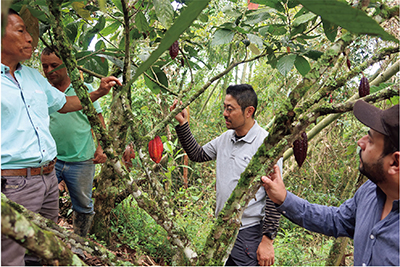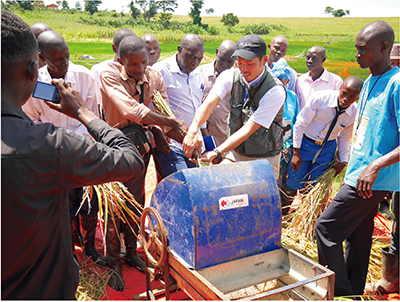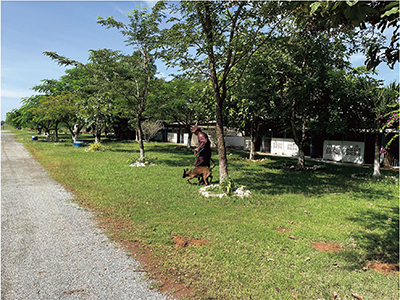2 Realizing Peaceful, Secure, and Stable Societies, and Maintenance and Strengthening of a Free and Open International Order Based on the Rule of Law
(1) Support for Peacebuilding and Refugees/Displaced Persons
The international community continues to witness regional and internal conflicts due to various factors such as ethnic, religious, and historical differences, as well as poverty, disparities, and other issues. In recent years, intensifying geopolitical competition and heightened tensions between nations, as well as the emergence of countries that challenge the existing international order more assertively, have left considerable negative impacts on the global economy, society, and stability.
Such conflicts generate a great number of refugees and displaced persons, resulting in humanitarian crises. These conflicts also undermine years of development efforts and cause significant economic losses. The impact of a conflict in one country or region affects the entire world in one way or another, and the prolongation of such conflicts has become a challenge. Russia’s aggression against Ukraine, which started in 2022, and the situation surrounding Israel and Palestine since the terrorist attacks by Hamas and other terrorist groups in October 2023 have spurred a serious humanitarian crisis, and had a major negative impact on the global economy, society, and stability. In addition, there are concerns about the impact of climate change on peace and stability. As the challenges faced by the international community become more complex and diverse, peacebuilding efforts aimed at establishing the foundations for development are increasingly important for the consolidation of sustainable peace.
● Japan’s Efforts
■ Support for Peacebuilding

A Japanese expert inspecting a cocoa farm under the “Project for Strengthening Inclusive Agricultural and Rural Development to Promote Peace Building with Legality (DRIP de PAZ)” in Colombia (Photo: JICA)
In response to humanitarian crises caused by conflicts, among other causes, Japan promotes the “Humanitarian-Development Nexus,” in which urgently needed humanitarian assistance is provided, taking into account the medium- to long-term perspective of development cooperation from its early stage. As humanitarian crises become more prolonged and diverse, Japan also places importance on the idea of the Humanitarian-Development-Peace Nexus (HDP Nexus),Note 38 in which assistance is provided to sustain peace through resilient state-building and social stabilization from a medium- to long-term view even in times of peace. In various countries and regions, Japan seamlessly extends humanitarian assistance, support for poverty reduction and economic development, and peacebuilding and conflict recurrence prevention assistance in order to bolster self-reliant development and address the root causes of crises.
In order to provide seamless assistance, Japan combines different types of support such as assistance through international organizations, grant aid, loan aid, and technical cooperation, and provides humanitarian assistance for refugees and displaced persons affected by conflicts, and assistance for conducting elections for post-conflict political peace processes. To promote the consolidation of peace and prevent the recurrence of conflict, Japan also supports the disarmament, demobilization and reintegration (DDR) of ex-combatants, security sector reform, and the enhancement of administrative, judicial, and police functions. Furthermore, Japan supports the development of economic infrastructure and institutions, as well as social sectors such as health and education. Japan also extends support for displaced persons’ coexistence with host communities, reconstruction in areas such as the repatriation and resettlement of refugees and displaced persons, and the rebuilding of basic socio-economic infrastructure. In these efforts, Japan actively promotes women’s participation in conflict prevention, conflict resolution, and peacebuilding in line with UN Security Council resolutions, including UNSC resolution 1325, which recognizes the importance of the role of women in peacebuilding (see Women, Peace and Security (WPS)).
As cases of sexual violence during Russia’s aggression against Ukraine have been confirmed, in 2023, Japan provided protection, counseling, and necessary services through UN Women to displaced women and girls affected by the war in Ukraine and its neighboring countries, including approximately 2,000 women who were survivors of sexual violence, and also conducted language and basic life skills training for approximately 1,500 women and girls to help maintain their livelihoods.
Discussions are taking place in the international community on conflict resolution and prevention, as well as post-conflict recovery and assistance for nation-building in forums such as the UN Peacebuilding Commission (PBC).Glossary Japan has been a member of the PBC since its establishment, and has made active contributions by emphasizing the importance of efforts to build institutions and to develop human resources, and the need to strengthen cooperation among related organizations (related UN bodies such as the UN Security Council, UN General Assembly and the PBC, donor countries, regional agencies, international financial institutions such as the World Bank and the IMF, and the private sector). As of December 2023, Japan contributed a total of 63.07 million US dollars to the UN Peacebuilding Fund (PBF)Glossary and supported it as a major donor. Japan started its two-year term as a non-permanent member of the UN Security Council in January 2023 and has contributed to peacebuilding efforts at the UN as one of its priorities during its term. For example, Japan hosted a ministerial-level open debate on peacebuilding in January 2023 during its presidency of the UN Security Council.
Japan has long made efforts to strengthen coordination between development cooperation and international peace cooperation activities such as UN peacekeeping operations (UN PKOs). In the countries and regions where UN PKOs are deployed, many initiatives are underway that contribute to efforts for protecting refugees/displaced persons, women, and children affected by conflict and developing basic infrastructure. To maximize the benefits of these efforts, it remains important for Japan to promote such forms of coordination. For example, in 2023, Japan provided assistance to approximately 4,500 victims of gender-based violence in Yemen. In addition, Japan provided capacity development training for 50 people involved in protection services, livelihood support to 200 women, and support for the capacity building of 100 women who will participate in peacebuilding, in order to promote efforts toward peace and stability in the country.
Japan proactively contributes to the “UN Triangular Partnership Programme (TPP),” in which trilateral parties, namely the UN, Supporting Member States, and Troop Contributing Countries, work together to conduct training and other activities for uniformed personnel to be dispatched to UN PKO missions. Under this framework, for example, Japan Self-Defense Forces (JSDF) personnel are dispatched to Africa and Asia to train engineering personnel on the operation of heavy engineering equipment. In the field of medical care, Japan dispatches JSDF personnel to conduct training on life-saving treatment and contributes to the development of telemedicine systems for UN PKO missions. At the UN General Assembly in September 2023, Prime Minister Kishida announced that Japan would expand support for peacebuilders. Specifically, given that African Union (AU)-led Peace Support Operations (AUPSOs) play an important role in maintaining peace and stability in Africa, the Government of Japan decided to contribute approximately 8.5 million US dollars for conducting training for personnel to be dispatched to AUPSOs under the TPP framework.
In addition, since the skill sets demanded of those in the field of peacebuilding are increasingly diversified and complex, Japan cultivates civilian specialists who can make a significant contribution on the ground both in Japan and abroad through the “Program for Global Human Resource Development for Peacebuilding and Development.”Note 39 So far, a total of over 950 people have participated in training programs in Japan. Many graduates of these programs are playing active roles in the fields of peacebuilding and development around the world including regions such as Asia and Africa.
■ Support for Refugees and Displaced Persons

Refugees in Uganda at a workshop on post-harvest rice processing by JICA (Photo: JICA)
Given the situations in Syria, Afghanistan, Myanmar, Ukraine, and other countries, the number of forcibly displaced people including refugees and displaced persons worldwide has been increasing year after year. In 2022, the number surpassed 100 million people, the highest level since the end of World War II, and humanitarian situations are becoming increasingly severe. Japan co-hosted the Second Global Refugee Forum (GRF) in Geneva in December 2023 and called for strengthening unity and cooperation of the international community to prevent the deterioration of humanitarian situations, to help refugees and displaced persons both at home and abroad become self-reliant, and to ease the pressures on host countries (see also “ODA Topics”). In addition, Japan provides humanitarian assistance from the viewpoint of human security, including assistance for refugees, displaced persons, and others, in order to ensure the life, dignity, and security of the people in the most vulnerable positions and to enable each person to get back on their own feet.
In particular, Japan works with international organizations, including the United Nations High Commissioner for Refugees (UNHCR), the World Food Programme (WFP), and the International Organization for Migration (IOM) to continue to provide assistance around the world by delivering supplies for basic human needs such as shelter and food. Japan works with the above UN agencies, the United Nations Relief and Works Agency for Palestine Refugees in the Near East (UNRWA), the International Committee of the Red Cross (ICRC), and other international organizations, and provides assistance for refugees, displaced persons, and others, even in areas with security concerns by utilizing their expertise and coordination capabilities. For example, in 2023, Japan extended Emergency Grant Aid to Sudan and its neighboring countries through WFP, UNHCR, IOM, and other organizations in order to provide food, essential goods, etc. in support of refugees and internally displaced persons affected by the military engagement in Sudan. Additionally, emergency humanitarian assistance is provided by Japanese NGOs through the Japan Platform (JPF)Note 40 (see also “Japanese Personnel at International Organizations Playing Active Roles on the Front Lines across the World”).
Upon providing this kind of assistance for refugees, displaced persons, and others through international organizations, Japan promotes cooperation among JICA, NGOs, and the private sector. For example, in the case of refugee assistance, UNHCR works in collaboration with JICA to implement a program combining emergency and reconstruction assistance. In addition, Japan provides assistance for refugees, displaced persons, and others in collaboration with JPF (see also “Featured Project”).
■ Actions against Anti-Personnel Landmines, Unexploded Ordnance, and Illicit Small Arms and Light Weapons

Mine detection dogs training at the CMAC training complex (Photo: JICA)
In post-conflict countries and regions, anti-personnel landmines and unexploded ordnance (UXO) remain, and illicit small arms and light weapons are still in wide circulation. This weaponry not only harms civilians indiscriminately and hinders reconstruction and development efforts, but also exacerbates animosities. Therefore, it is important to render sustained cooperation with a view to ensuring safety and increasing stability in these countries and regions through assistance for the disposal of anti-personnel landmines and UXO, proper management of small arms and light weapons, support for landmine survivors, and capacity building for personnel involved in UXO/mine action.
Japan also conducts steady international cooperation from the perspective of the HDP Nexus as a signatory to the “Convention on the Prohibition of the Use, Stockpiling, Production and Transfer of Anti-Personnel Mines and on their Destruction” and the “Convention on Cluster Munitions,” through preventive measures such as risk reduction education, in addition to mine clearance and assistance for survivors. For example, Japan supports the Cambodian Mine Action Centre (CMAC) with an overall capacity enhancement program, such as strengthening its training capacity at home and abroad, capacity building of its administrative staff, and the development of its information systems so that CMAC can make further international contributions. Japan also supports the upgrading of CMAC’s training complex and outreach facility in order to improve its training and educational environment for mine-action personnel and to raise awareness of landmine issues among visitors.
Through such comprehensive support, CMAC has provided training for mine action officials in third countries, such as Colombia and Laos. In addition, CMAC has conducted training for officials of the Government of Ukraine on the use of mine detectors in Cambodia in January 2023 and in Poland in July 2023, as well as awareness-raising activities for residents, thereby, contributing to the realization of South-South cooperation.Note 41 In Laos, where the damage caused by UXO is particularly severe, in addition to training at CMAC, Japan dispatches experts to UXO Lao, a UXO countermeasure organization, to strengthen its operational capacity for formulating work plans and monitoring, while also developing facilities for its activities and providing equipment such as mine detection sensors. Utilizing its experience and knowledge gained through many years of cooperation in mine action in Cambodia and other parts of the world, Japan proactively assists in the clearance of mines and UXO in Ukraine, which is essential not only to ensure the safety and security of residents but also to rebuild livelihoods, agriculture, and industries in its post-war reconstruction.
Japan also contributes to the improvement of connectivity in the Western Balkans by supporting mine clearance activities in Bosnia and Herzegovina conducted by a Slovenia-based international nonprofit organization ITF Enhancing Human Security in cooperation with the Bosnia and Herzegovina Mine Action Center.
In Afghanistan, the Association for Aid and Relief, Japan (AAR Japan), a Japanese NGO, implements education projects such as the development of educational materials and conducting seminars, with the aim of raising awareness on the risks of landmines, UXO, and other remnants of conflict, and on the appropriate ways of avoiding them, through the Grant Assistance for Japanese NGO Projects (since FY2009) and projects by JPF (since FY2001). The reach of these awareness activities to residents is steadily expanding.
In addition to providing such bilateral support, Japan is proactively engaged in measures against mines and UXO through international organizations. In 2023, Japan conducted clearance, risk education, and victim assistance against landmines and UXO through the United Nations Mine Action Service (UNMAS) in Afghanistan, Syria, Palestine, Sudan, Nigeria, and South Sudan. For example, in Syria, Japan provided assistance to victims of explosive ordnance and worked to formulate a framework for the implementation of assistance to victims through UNMAS. In 2023, Japan also provided support for mine risk reduction education in the Central African Republic, Chad, Iraq, Palestine, South Sudan, Ukraine, and Yemen via the United Nations Children’s Fund (UNICEF). It also provides support including risk reduction education in countries and regions such as Afghanistan, Myanmar, Syria, Ukraine, and other countries through the ICRC.
Small arms and light weapons are called “the de-facto weapons of mass destruction” because they are still used in actual conflicts and claim many lives. Japan is a donor country to the “Saving Lives Entity (SALIENT),” a UN fund established to embody the commitment made by UN Secretary General Guterres in “An Agenda for Disarmament (2018),” and actively contributes to the discussions on countermeasures against small arms and light weapons.
Glossary
- UN Peacebuilding Commission (PBC)
- An advisory body to the UN Security Council and the General Assembly established in accordance with the Security Council and General Assembly resolutions in 2005. The PBC aims to advise and propose integrated strategies for post-conflict peacebuilding and recovery. It provides advice to the Security Council and the General Assembly, among others through briefings and written submissions. Japan has consistently served as a member of the Organizational Committee, which is a central body of the PBC, since its establishment.
- UN Peacebuilding Fund (PBF)
- A fund established in 2006. The fund provides assistance in Africa and other regions to prevent the recurrence of regional conflicts and civil wars after their end, and assistance for conflict prevention. Specifically, it supports peace processes and political dialogue, revitalization of economies, institution building of states, and participation of women and youth in state-building, among other efforts.
- Note 38: In parallel with humanitarian assistance, the approach of the HDP Nexus is to provide development cooperation to enhance refugee self-reliance and reduce the burden on host countries, and also to address the root causes of refugee issues by promoting peace efforts to resolve and prevent conflicts.
- Note 39: In FY2007 Japan began the “Program for Human Resource Development for Peacebuilding,” and in FY2015, the program was renewed with expanded content as the “Program for Global Human Resource Development for Peacebuilding and Development” (https://www.mofa.go.jp/mofaj/gaiko/peace_b/j_ikusei_shokai.html (in Japanese only)). The renewed program includes the “Mid-Career Course,” which supports the career advancement of those with a certain degree of practical experience in fields related to peacebuilding and development, in addition to the existing “Primary Course,” which offers training in Japan to acquire the knowledge and skills necessary on the ground and on-the-job training at the field offices of international organizations.
- Note 40: See the glossary.
- Note 41: See the glossary.
